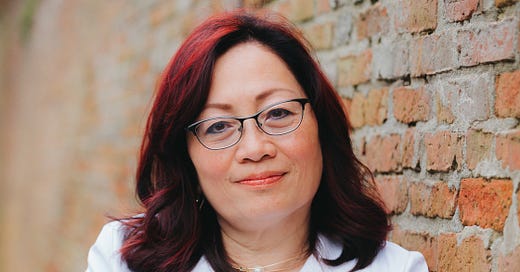Dr. Melissa Ing is my latest guest on the podcast.
In 2011, Dr. Ing got her dream job as an associate professor in the Dept. of Comprehensive Care at Tufts University School of Dental Medicine. which was her alma mater.
Just a few months after beginning her dream job, an older colleague, Dr. Roland Vanaria, began to sexually harass her.
“He was taunting me with unwanted sexual comments and gestures. He would say things like, ‘Why don’t you come on over: lift your lab coat.’ He would slap his thigh and say, “Hun, why don’t you sit on my lap?” Dr. Ing told me during the podcast.
In an unpublished editorial, Dr. Ing explained further.
In 2017, things came to a head. Dr. Ing complained several times to her immediate boss, Dr. Peter Arsenault. She told me she remembers speaking to him several times, but he failed to do anything.
So, she wrote an email.
“I wish you didn’t put it in writing,” Dr. Ing said Dr. Arsenault said in response, “Now, I have to do something.”
I reached out to Dr. Arsenault, but I received no response.
Dr. Ing said that a Title IX case was opened, but she also faced retaliation.
Dr. Arseneault changed the work schedule and put Dr. Ing with her harasser, Dr. Vanaria.
Dr. Ing told me she found out about fifteen minutes before she was to begin work; worse yet, Dr. Arsenault told her that if she didn’t want to work with Dr. Vanaria that she needed to find a replacement.
She told me that she begged another professor, who said no, but that another colleague overheard and agreed to switch shifts.
Dr. Ing was not the only person harassed by Dr. Vanaria.
Dr. Ing was the subject of a 2021 Boston Globe article.
Following the release of that article, the Globe received emails from multiple people to say they too were harassed by Dr. Vanaria. Here is part of one email.
I am a 2018 Tufts University dental school graduate who was taught by Dr. Ing, and also had interactions with Roland Vanaria in the Tufts student clinic. To Tufts students who have interacted with him this is no surprise. In my fourth year as a student, I submitted an anonymous title IX complaint about Roland Vanaria after he made some particularly misogynistic comments to me while he was in the middle of grading me for a procedure in our student clinic. As a fourth year student just trying to graduate, I did not follow through meeting with an investigator for fear of retaliation.
The Globe received a second email.
I attended TUSDM from 2011-2015. I was trained by both doctors Vanaria and Ing.
This individual also provided an affidavit.
It was not Dr. Vanaria who was punished, but Dr. Ing herself, she told me.
The next form of retaliation was when she was left off a conference she had previously attended regularly.
After that, she applied for a promotion. Not only did she not get it, but no one even told her.
She said she went to the human resources department and only after inquiring was she finally told that she did not get this promotion.
Soon after the Chair of the department was replaced with Dr. Andrea Zandano. At a meeting about three weeks later, Dr. Zandona stated, “I most likely am not going to promote you.”
Dr. Ing had two subsequent meetings with Dr. Zandona where she was told again that she would not be promoted: on one occasion, Dr. Ing told me that she was told that she was qualified but would still not be promoted.
After facing the prospect of a dead-end career, Dr. Ing had no choice but to leave her dream job.
She has since been involved in litigation, and Tufts University issued this statement.
Last year, the US District Court for the District of Massachusetts entered summary judgement for the University in this matter and dismissed Dr. Ing’s complaint against the University. Dr. Ing has appealed the decision to the First Circuit Court of Appeals and that appeal is pending. The University will continue to defend this matter consistent with its position that the University handled this matter properly, and in accordance with applicable University policies and law, and will otherwise not comment on this pending litigation.
After her suit was dismissed, she was the subject of a negative piece in Bloomberg.
Tufts University in Massachusetts beat sex discrimination and retaliation claims brought by a School of Dental Medicine professor who said she wasn’t promoted because she’d complained of harassment by a fellow instructor.
The US District Court for the District of Massachusetts ruled former professor Melissa Ing failed to show that she was otherwise qualified for the promotion, or that Tufts’s denial reasoning was pretext for discrimination. The court granted the university summary judgment on all claims Thursday.
Ing was an associate professor of dental medicine from 2011 to 2021, according to the order. In 2017 she reported that her fellow professor Dr. Roland Vanaria.
Dr. Ing remains undaunted; she tells me that academia faces widespread problems regarding sexual harassment.
A study from 2018 found that,
System-wide changes to the culture and climate in higher education are needed to prevent and effectively respond to sexual harassment. There is no evidence that current policies, procedures, and approaches—which often focus on symbolic compliance with the law and on avoiding liability—have resulted in a significant reduction in sexual harassment. Colleges and universities and federal agencies should move beyond basic legal compliance to adopt holistic, evidence-based policies and practices to address and prevent all forms of sexual harassment and to promote a culture of civility and respect. The cumulative result of sexual harassment in academic sciences, engineering, and medicine is significant damage to research integrity and a costly loss of talent in these fields. Institutions should thus consider sexual harassment equally important as research misconduct in terms of its effect on the integrity of research. These key findings are explored in the National Academies report, Sexual Harassment of Women: Climate, Culture, and Consequences in Academic Sciences, Engineering, and Medicine.
An article from 2020 noted.
While many academic institutions are searching for ways to prevent sexual assault and sexual coercion among their faculty members, staff and students, they are failing to address the most common forms of gender-based harassment, say experts who study harassment and discrimination at work and in academic and health care settings.
In an opinion published in the Proceedings of the National Academy of Sciences, the experts focus on behaviors that communicate derision, disgust or disrespect for members of one sex or gender group.
"By far the most prevalent form of sexual harassment is the put-down, or what social scientists call gender harassment: comments, cartoons, jokes, gestures and other insults," the researchers wrote. "Sometimes the put-downs are sexually degrading and crude, and other times they are contemptuous without sexual content."
"Gender-based harassment is insidious because it's not always distinguishable from criticism or rudeness," said Kathryn Clancy, a professor of anthropology at the University of Illinois, Urbana-Champaign and the first author of the report. "How do you report that someone told you that you have a 'mommy brain'? Or that you are hard to listen to with your high-pitched voice?"
As such, Dr. Ing supported Washington State Representative Gerry Pollet when he introduced the bill: Stop Pass the Harasser.
Stop Pass the Harasser will put all academics who had sexual harassment allegations substantiated in a central database so that if they move on in academics, those at their new school will be aware of the findings.
A statement from State Representative Pollet after the Stop Pass the Harasser was passed noted.
House Bill 2327, sponsored by Rep. Gerry Pollet, D-Seattle, requires that colleges and universities include any substantiated findings of sexual misconduct in an employee’s personnel file and disclose those findings when asked by another institution. Colleges and universities must also ask about sexual misconduct findings at other institutions before hiring.
The bill also ends the common practice of an employee accused of sexual misconduct ending the investigation by leaving their job. Colleges and universities must complete all sexual misconduct investigations and cannot use non-disclosure agreements that keep such investigations hidden. These laws will apply to both private and public institutions.
“Students deserve protection from faculty, coaches or administrators who are serial sexual harassers or predators,” said Pollet, who teaches at the University of Washington (UW). “A school should know if someone they are hiring has a history of sexual harassment or assault. It’s time to end pass-the-harasser and protect our students.”
Dr. Ing explained that academics worked much like the Catholic Priests. Harassers were allowed to leave, promoted, or moved on, and their misdeeds were not reported.
As such, serial harassers were allowed to continue with their careers with unsuspecting victims. Stop Pass the Harasser will end that revolving door.



















Share this post